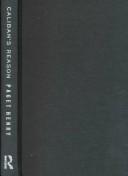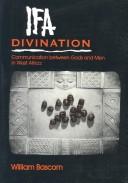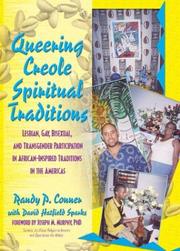| Listing 1 - 10 of 13 | << page >> |
Sort by
|

ISBN: 1135958815 1280406984 0203900103 9780203900109 9780415926454 0415926459 9780415926461 0415926467 9781280406980 0415926459 0415926467 9786610406982 6610406987 9781135958817 9781135958763 9781135958800 1135958807 Year: 2000 Publisher: New York : Routledge,
Abstract | Keywords | Export | Availability | Bookmark
 Loading...
Loading...Choose an application
- Reference Manager
- EndNote
- RefWorks (Direct export to RefWorks)
Paget introduces the general reader to Afro-Caribbean philosophy in this ground-breaking work. Since Afro-Caribbean thought is inherently hybrid in nature, he traces the roots of this discourse in traditional African thought and in the Christian and Enlightenment traditions of Western Europe.
Philosophy, Black --- Philosophy. --- Mental philosophy --- Humanities --- Black philosophy --- Afro-Caribbean cults --- Philosophy --- Philosophy, Black - West Indies --- Afro-Caribbean cults - Philosophy --- West Indies. --- Karibik. --- Westindien. --- Schwarze.

ISBN: 1282079557 9786612079559 0585137935 9780253114655 0253114659 9780253206381 9780253328908 9780585137933 025332890X 0253206383 Year: 1969 Publisher: Bloomington, Ind. Indiana University Press
Abstract | Keywords | Export | Availability | Bookmark
 Loading...
Loading...Choose an application
- Reference Manager
- EndNote
- RefWorks (Direct export to RefWorks)
""The sacred texts of Ifa, repository of the accumulated wisdom of countless generations of Yoruba people, are an invaluable source not only for all students of African oral literature and Yoruba civilization, but also for future generations interested in the continuing vitality of Ifa divination and a Yoruba way of life and thought."" -Henry DrewalThis landmark study of Ifa, the most important and elaborate system of divination of the Yoruba people of Nigeria, remains a monumental contribution to scholarship in anthropology, folklore, religion, philosophy, linguistics, and African a
Yoruba (African people) --- Geomancy --- Ifa (Religion) --- Geomanty --- Divination --- Fa (Religion) --- Ifa --- Ifa (Cult) --- Afro-Caribbean cults --- Cults --- Religion. --- Ifa.

ISBN: 1315783878 1317712811 131771282X 9781317712817 1560233508 9781560233503 1560233516 9781560233510 9781317712824 9781315783871 9781317712800 Year: 2004 Publisher: New York
Abstract | Keywords | Export | Availability | Bookmark
 Loading...
Loading...Choose an application
- Reference Manager
- EndNote
- RefWorks (Direct export to RefWorks)
What roles do queer and transgender people play in the African diasporic religions? Queering Creole Spiritual Traditions: Lesbian, Gay, Bisexual, and Transgender Participation in African-Inspired Traditions in the Americas is a groundbreaking scholarly exploration of this long-neglected subject. It offers clear insight into the complex dynamics of gender and sexual orientation, humans and deities, and race and ethnicity, within these richly nuanced spiritual practices. Queering Creole Spiritual Traditions explores the ways in which gender complexity and same-sex intimacy are integral
Homosexuality --- Afro-Caribbean cults. --- Cults, Afro-Caribbean --- Cults --- Homosexuality (in religion, folk-lore, etc.) --- Religious aspects. --- Afro-Caribbean religions.
Book
ISBN: 168340419X 1683403908 1683403967 Year: 2023 Publisher: Gainesville, FL : University of Florida Press,
Abstract | Keywords | Export | Availability | Bookmark
 Loading...
Loading...Choose an application
- Reference Manager
- EndNote
- RefWorks (Direct export to RefWorks)
"First-person accounts that show the expanding demographics of African-descended religions In this focused portrayal of global dispersal and spiritual sojourning, Martin Tsang draws together first-person accounts of the evolving Afro-Atlantic religious landscape. Spirited Diasporas offers a glimpse into the frequently misunderstood religions of Afro-Cuban LukumiÌ, Haitian Vodou, and Brazilian CandombleÌ, adding to the growing research on the transnational yet personal nature of African diasporic religions. In these accounts, practitioners from many origins illustrate the work and commitment they undertook to learn and become initiated in these traditions. They reveal in the process a variety of experiences that are not often documented. Their perspectives also show the expanding contemporary demographics of African-descended religions, many of whose members identify as LGBTQ or are part of other minoritized populations, and they counter inaccurate and often racialized portrayals of these religions as being anti-modern and geographically limited. Through the voices of the professionals, scholars, and activists gathered here, readers will appreciate the purpose and belonging to be found in the far-reaching communities of these Latin American and Caribbean spiritualities. As the seekers in these stories discover and come home to their new religious families, Spirited Diasporas displays the relevance and generative power of these traditions."-- "Through a variety of first-person accounts, this book offers a glimpse into the frequently misunderstood religions of Afro-Cuban LukumiÌ, Haitian Vodou, and Brazilian CandombleÌ, adding to the growing research on the transnational yet personal nature of African diasporic religions"--
Black people --- Black people --- Afro-Caribbean cults --- Religion. --- Religious life and customs. --- History. --- Atlantic Ocean Region --- Religion --- History.
Book
ISBN: 0231552025 Year: 2021 Publisher: New York : Columbia University Press,
Abstract | Keywords | Export | Availability | Bookmark
 Loading...
Loading...Choose an application
- Reference Manager
- EndNote
- RefWorks (Direct export to RefWorks)
Ms. Donna Haskins is an African American woman who wrestles with structural inequity in the streets of Boston by inhabiting an alternate dimension she refers to as the "spirit realm." In this other place, she is prepared by the Holy Spirit to challenge the restrictions placed upon Black female bodies in the United States. Growing into her spiritual gifts of astral flight and time travel, Donna meets the spirits of enslaved Africans, conducts spiritual warfare against sexual predators, and tends to the souls of murdered Black children whose ghosts haunt the inner city.Take Back What the Devil Stole centers Donna's encounters with the supernatural to offer a powerful narrative of how one woman seeks to reclaim her power from a lifetime of social violence. Both ethnographic and personal, Onaje X. O. Woodbine's portrait of her spiritual life sheds new light on the complexities of Black women's religious participation and the lived religion of the dispossessed. Woodbine explores Donna's religious creativity and her sense of multireligious belonging as she blends together Catholic, Afro-Caribbean, and Black Baptist traditions. Through the gripping story of one local prophet, this book offers a deeply original account of the religious experiences of Black women in contemporary America: their bodies, their haunted landscapes, and their spiritual worlds.
Christianity and other religions --- Afro-Caribbean cults. --- African. --- Haskins, Donna. --- Boston (Mass.) --- Religious life and customs. --- African American religion. --- Boston. --- black women. --- ethnography of religion. --- lived religion. --- spirituality.
Book
ISBN: 0253018900 025301896X 9780253018960 9780253018823 025301882X 9780253018908 0861591054 Year: 2016 Publisher: Bloomington
Abstract | Keywords | Export | Availability | Bookmark
 Loading...
Loading...Choose an application
- Reference Manager
- EndNote
- RefWorks (Direct export to RefWorks)
With essays from the most respected scholars in the field, the book makes a substantial contribution toward understanding Ifá and its role in contemporary Yoruba and diaspora cultures.
Ifa (Religion) --- Afro-Caribbean cults. --- Orisha religion. --- Divination. --- Yoruba (African people) --- Fa (Religion) --- Ifa --- Ifa (Cult) --- Afro-Caribbean cults --- Cults --- Cults, Afro-Caribbean --- Orisa religion --- Shango --- Shango (Cult) --- Religions --- Augury --- Soothsaying --- Occultism --- Worship --- Art. --- Religion. --- Ifa (Religion). --- Ifa. --- Afro-Caribbean religions.
Book
ISBN: 0813050456 0813055024 9780813055022 1322181969 9781322181967 9780813050454 9780813049700 0813049709 Year: 2014 Publisher: Gainesville University Press of Florida
Abstract | Keywords | Export | Availability | Bookmark
 Loading...
Loading...Choose an application
- Reference Manager
- EndNote
- RefWorks (Direct export to RefWorks)
"From a plantation in Havana Province in the 1880s to a religious center in Spanish Harlem in the 1960s, this book profiles four generations of women from one Afro-Cuban religious family. The women were connected by their prominent roles as leaders in the religions they practiced and the dramatic ritual artwork they created. Each was a medium in Espiritismo--communicating with dead ancestors for guidance or insight--and also a santera, or priest of Santería, who could engage the oricha pantheon. Kristine Juncker argues that by creating art for more than one religion these women shatter the popular assumption that Afro-Caribbean religions are exclusive organizations. The portraiture, sculptures, and photographs in Afro-Cuban Religious Arts offer rare and remarkable glimpses into the rituals and iconography of Espiritismo and Santería. Santería altars are closely guarded, limited to initiates, and typically destroyed upon the death of the santera while Espiritismo artifacts are rarely considered valuable enough to pass on. The unique and protean cultural legacy detailed here reveals how ritual art became popular imagery, sparked a wider dialogue about culture inheritance, attracted new practitioners, and enabled Afro-Cuban religious expression to explode internationally."--Publisher's website.
Santeria. --- Espiritismo (Cult) --- Spiritualism in art. --- Folk art, Black --- Black folk art --- Afro-Caribbean cults --- Spiritualism --- Lucumí (Religion) --- Lukumi (Religion) --- Ocha (Religion) --- Regla de Ocha --- Regla Lucumi --- Regla Lukumi --- Santeria (Cult) --- Santeria (Cultus) --- Cults --- Espiritismo.
Book
ISBN: 9956763357 9789956763351 9789956763351 Year: 2018 Publisher: Baltimore, Maryland : Baltimore, Md. : Project Muse, Project MUSE,
Abstract | Keywords | Export | Availability | Bookmark
 Loading...
Loading...Choose an application
- Reference Manager
- EndNote
- RefWorks (Direct export to RefWorks)
How really worth are the African endogenous knowledge and know-how? Why and how can we promote this inheritage, while the so-called western scientific model looks like the best means of knowing and mastering the world? This book answers these questions by examining ifa, a West-African system of knowledge and practices which a narrow knowledge reduces to a fanciful divinatory art, an art then logically "perceived as inconsistent and theoretically useless". Yet, more than a divinatory art, ifa, when we submit it to analysis, appears to be an organized set of knowledge and researches, a science in the making. What makes us really think that way is the intellectual vocation that defines ifa, the rigor of the logical operations that it implies and which recalls in one way or the other the game of implicit mathematics, the objectivity requirement which is valued by the actors of the system and rests on a genuine critical tradition. This opinion is also based on the weight of myths upon which ifa rests and which constitute an important granary where a prominent set of knowledge is packed. Beyond the establishment of the consistency and the limitations of ifa, this book has strived to define a "method" of examination and validation of the knowledge which has emerged out of the official scientific system. In fact, the questions which arise from it are finally intended to give a new foundation to philosophy of sciences and to epistemology.
Ethnoscience --- Knowledge, Theory of --- Ifa (Religion) --- Fa (Religion) --- Ifa --- Ifa (Cult) --- Afro-Caribbean cults --- Cults --- Indigenous knowledge systems --- Traditional knowledge systems (Ethnology) --- Ethnology --- Science --- Epistemology --- Theory of knowledge --- Philosophy --- Psychology --- Ifa.
Book
ISBN: 9780231552028 0231552025 9780231197168 Year: 2021 Publisher: New York, NY
Abstract | Keywords | Export | Availability | Bookmark
 Loading...
Loading...Choose an application
- Reference Manager
- EndNote
- RefWorks (Direct export to RefWorks)
Ms. Donna Haskins is an African American woman who wrestles with structural inequity in the streets of Boston by inhabiting an alternate dimension she refers to as the "spirit realm." In this other place, she is prepared by the Holy Spirit to challenge the restrictions placed upon Black female bodies in the United States. Growing into her spiritual gifts of astral flight and time travel, Donna meets the spirits of enslaved Africans, conducts spiritual warfare against sexual predators, and tends to the souls of murdered Black children whose ghosts haunt the inner city.Take Back What the Devil Stole centers Donna's encounters with the supernatural to offer a powerful narrative of how one woman seeks to reclaim her power from a lifetime of social violence. Both ethnographic and personal, Onaje X. O. Woodbine's portrait of her spiritual life sheds new light on the complexities of Black women's religious participation and the lived religion of the dispossessed. Woodbine explores Donna's religious creativity and her sense of multireligious belonging as she blends together Catholic, Afro-Caribbean, and Black Baptist traditions. Through the gripping story of one local prophet, this book offers a deeply original account of the religious experiences of Black women in contemporary America: their bodies, their haunted landscapes, and their spiritual worlds.
Christianity and other religions --- Afro-Caribbean cults. --- African. --- Haskins, Donna. --- Boston (Mass.) --- Religious life and customs. --- African American religion. --- Boston. --- black women. --- ethnography of religion. --- lived religion. --- spirituality. --- Afro-Caribbean religions.
Book
ISBN: 1283636891 0826343554 9780826343550 9781283636896 6613949353 9786613949356 9780826343536 0826343538 Year: 2008 Publisher: Albuquerque University of New Mexico Press
Abstract | Keywords | Export | Availability | Bookmark
 Loading...
Loading...Choose an application
- Reference Manager
- EndNote
- RefWorks (Direct export to RefWorks)
Dodson examines the history of traditional religious practices in the Oriente region of contemporary Cuba.
Afro-Caribbean cults --- Sacred space --- Cults, Afro-Caribbean --- Cults --- Holy places --- Places, Sacred --- Sacred places --- Sacred sites --- Sacred spaces --- Sites, Sacred --- Space, Sacred --- Holy, The --- Religion and geography --- Holguín (Cuba : Province) --- Oriente (Cuba : Province) --- Religious life and customs. --- Afro-Caribbean religions
| Listing 1 - 10 of 13 | << page >> |
Sort by
|

 Search
Search Feedback
Feedback About UniCat
About UniCat  Help
Help News
News